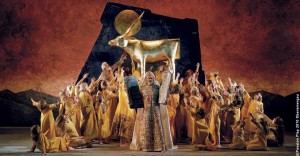Be exalted above the heavens, O God; let Your glory be above all the earth. (Psalm 57:5)
 Context is critical when it comes to determine the actual meaning of a scriptural passage, and how it is to be applied. I love getting wrapped up in individual words and their meanings and nuances, but if I lose sight of the context, then I commit a grave error as described in the idiom: “Can’t see the forest for the trees”, which reminds us that we need perspective, we need context.
Context is critical when it comes to determine the actual meaning of a scriptural passage, and how it is to be applied. I love getting wrapped up in individual words and their meanings and nuances, but if I lose sight of the context, then I commit a grave error as described in the idiom: “Can’t see the forest for the trees”, which reminds us that we need perspective, we need context.
So here is David crying out a reality about God’s existence, His presence and His glory. He IS exalted above the heavens; and His glory IS above all the earth. That is His nature, and David is sharing with us, that he gets it. But what is interesting about this Psalm, is what this verse is sandwiched in between.
My soul is among lions; I must lie among those who breathe forth fire, even the sons of men, whose teeth are spears and arrows and their tongue a sharp sword. Be exalted above the heavens, O God; let Your glory be above all the earth. They have prepared a net for my steps; my soul is bowed down; They dug a pit before me.
David is a dangerous place, surrounded by lions and dragons; and men whose teeth are like spears and arrows, and their tongues like sharp swords. And in the midst of this dangerous and even deadly place, David exalts the Lord. So an obvious question here would be, is there ever a time when it is NOT appropriate to worship the Lord? Oh by the way, David is weighed down, bent down, making it difficult to navigate around nets and pits, as well as lions, dragons and scary men.
Are you surrounded by enemies, by sickness, by loss, by sin? In the midst of all that, take David’s example to heart, and exalt the LORD.
Next time, we go a little further.

 Wisdom. It’s not something that is typically sought out; for rare indeed are those who think it useful. But Scripture tells us otherwise:
Wisdom. It’s not something that is typically sought out; for rare indeed are those who think it useful. But Scripture tells us otherwise:
 Catching up, picking up; plans and conversations… gone. And it wasn’t just an reunion that was gone, a friend was gone. A daughter was gone. I don’t know how God gave me this verse, but it arrived in the midst of my grief. And I learned an indelible lesson on numbering my days. I learned to count each day, every day, every conversation, every person as precious, and that tomorrow (or several months hence) wasn’t promised.
Catching up, picking up; plans and conversations… gone. And it wasn’t just an reunion that was gone, a friend was gone. A daughter was gone. I don’t know how God gave me this verse, but it arrived in the midst of my grief. And I learned an indelible lesson on numbering my days. I learned to count each day, every day, every conversation, every person as precious, and that tomorrow (or several months hence) wasn’t promised. Or is it a gift from God? I pray that it would be the latter. One more day to experience His mercy, grace, and love. One more day to celebrate His creation. And one more day to walk with and embrace His people.
Or is it a gift from God? I pray that it would be the latter. One more day to experience His mercy, grace, and love. One more day to celebrate His creation. And one more day to walk with and embrace His people. Idols. Useless gods. Do you serve any useless gods? When God with His own finger wrote out the 10 Commandments for Moses, the first of them was: Do not worship any god except me. Do not make idols that look like anything in the sky or on earth or in the ocean under the earth. Don’t bow down and worship idols. I am the Lord your God, and I demand all your love. (Exodus 20:3-5)
Idols. Useless gods. Do you serve any useless gods? When God with His own finger wrote out the 10 Commandments for Moses, the first of them was: Do not worship any god except me. Do not make idols that look like anything in the sky or on earth or in the ocean under the earth. Don’t bow down and worship idols. I am the Lord your God, and I demand all your love. (Exodus 20:3-5) a mentor named Rick when I was at the Conservatory. He was a retired Baptist missionary, and was now on the payroll of a large hospital in the Central Valley as their chaplain. Whenever there was a difficult situation, Rick was called in to minister to the family, and help the patient to step into eternity to meet Jesus. There was this one old man who had just hours to live, and the hospital asked Rick to visit him. He had no family, he was alone, and Rick chose to sit and wait with him.
a mentor named Rick when I was at the Conservatory. He was a retired Baptist missionary, and was now on the payroll of a large hospital in the Central Valley as their chaplain. Whenever there was a difficult situation, Rick was called in to minister to the family, and help the patient to step into eternity to meet Jesus. There was this one old man who had just hours to live, and the hospital asked Rick to visit him. He had no family, he was alone, and Rick chose to sit and wait with him. The next phrase in the verse is one of scope: Everyone who trusts in them. I have said and written on numerous occasions, when there is a sweeping generalization, if it is God doing the sweeping, then it must be taken literally, for He alone can address or accomplish those generalizations. So when the Father says everyone, He means everyone. No wiggle room.
The next phrase in the verse is one of scope: Everyone who trusts in them. I have said and written on numerous occasions, when there is a sweeping generalization, if it is God doing the sweeping, then it must be taken literally, for He alone can address or accomplish those generalizations. So when the Father says everyone, He means everyone. No wiggle room. Last week we talked about the nature of idols. This week we look at the nature of their makers. And this is a very scary verse: Those who make them will become like them, everyone who trusts in them. In other words— dead. If you want to live, then you must believe in the living God. But if you don’t care about eternal life, then any idol serve its purpose, to lead you to death.
Last week we talked about the nature of idols. This week we look at the nature of their makers. And this is a very scary verse: Those who make them will become like them, everyone who trusts in them. In other words— dead. If you want to live, then you must believe in the living God. But if you don’t care about eternal life, then any idol serve its purpose, to lead you to death. When the Psalmist speaks of “Their”, he is speaking about the nations. And these nations had tangible, visible idols. These so-called gods were obviously important to them, because they were made of gold and silver; precious metals for precious gods. But as is often the case with mankind who has not been exposed to the principles and teachings of the Most High God, we get it wrong. Or in this case we get a completely backwards. Note that it says, The work of man’s hands. God is not the work of our hands; we are the work of His hands.
When the Psalmist speaks of “Their”, he is speaking about the nations. And these nations had tangible, visible idols. These so-called gods were obviously important to them, because they were made of gold and silver; precious metals for precious gods. But as is often the case with mankind who has not been exposed to the principles and teachings of the Most High God, we get it wrong. Or in this case we get a completely backwards. Note that it says, The work of man’s hands. God is not the work of our hands; we are the work of His hands. Idols are pretty much no longer silver and gold, but they still are that which are either made by man’s hands or by his imagination. Idols are things which you pursue, instead of One True God. But, we are told: Whatever you do, do your work heartily, as for the Lord rather than for men. (Colossians 3:23) To do otherwise is a dangerous pursuit. More about that next week.
Idols are pretty much no longer silver and gold, but they still are that which are either made by man’s hands or by his imagination. Idols are things which you pursue, instead of One True God. But, we are told: Whatever you do, do your work heartily, as for the Lord rather than for men. (Colossians 3:23) To do otherwise is a dangerous pursuit. More about that next week. Now comes the personal request: I sought the LORD and he answered me, He delivered me from all my fears.
Now comes the personal request: I sought the LORD and he answered me, He delivered me from all my fears. Years ago I remember Billy Graham talking about one of the ways he did devotions—5 psalms a day and one chapter of Proverbs. So at the end of each month, he would have read through both books. Whenever I am not in front of one of my computers doing my study/devotion/prayer (I am currently working on the Fruit of the Spirit) I use this 5 x 1 study to come into His Presence.
Years ago I remember Billy Graham talking about one of the ways he did devotions—5 psalms a day and one chapter of Proverbs. So at the end of each month, he would have read through both books. Whenever I am not in front of one of my computers doing my study/devotion/prayer (I am currently working on the Fruit of the Spirit) I use this 5 x 1 study to come into His Presence. How often are we blessing and extolling the LORD? At all times. In Hebrew all times means at all events, all occasions, and at all times. This word is more than a generalization, it can be absolute; and in its definition are “all for every”, and “all the everywhere”. When God says all, He means all.
How often are we blessing and extolling the LORD? At all times. In Hebrew all times means at all events, all occasions, and at all times. This word is more than a generalization, it can be absolute; and in its definition are “all for every”, and “all the everywhere”. When God says all, He means all. This is a great question, because it describes with uncanny accuracy what has been going on in our nation: the Supreme Court’s decision to legalize same sex marriage; the rush to approve and even applaud transgender procedures; and the tolerance-screamers, who show no resemblance to what the purportedly proclaim. I could go on describing our upside-down culture, but I’ve made my point. The foundations have collapsed.
This is a great question, because it describes with uncanny accuracy what has been going on in our nation: the Supreme Court’s decision to legalize same sex marriage; the rush to approve and even applaud transgender procedures; and the tolerance-screamers, who show no resemblance to what the purportedly proclaim. I could go on describing our upside-down culture, but I’ve made my point. The foundations have collapsed. I love this verse because it brings hope to an entire world.
I love this verse because it brings hope to an entire world.